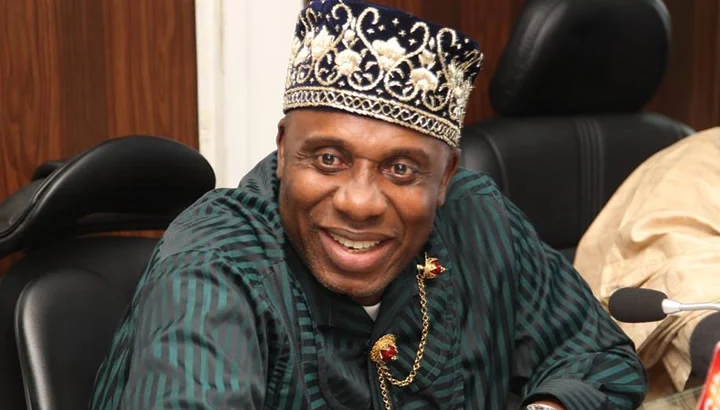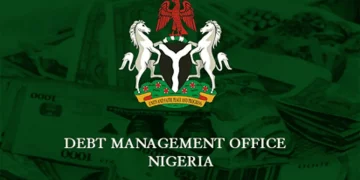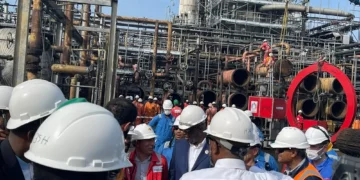The appointment of the immediate past minister of Transportation, Rotimi Amaechi, by President Muhammadu Buhari in November 2015 and his re-appointment in 2019, to head the nation’s Transportation ministry generated mixed-reactions and drew bad blood among maritime stakeholders who have been calling for appointment of technocrats as minister.
The fear was that an outsider may not be able to harness the over N7 trillion potentials in the maritime sector. Also they fear abandonment of the sector and the minister leaving little or no impact like his predecessors were nursed at the beginning by stakeholders and this eventually came to pass as the minister personally agreed to have abandoned the sector by focusing solely on railway sub-sector.
However, before he left the ministry, the maritime sector experienced some level of development such as the deep blue project to fight piracy on the nation’s coastal water and the Gulf of Guinea (GoG), connecting the Lagos seaports by rail to ease the transportation bottlenecks and the electronic Call-up system, but majority of the policies that will help put the nation on the global maritime map were not implemented and abandoned.
During his over six years as transportation minister, Nigeria failed bid to be on the International Maritime Organisation Category C council twice and this was due to some maritime policies and programmes that were missing.
For instance despite his assurance of setting up single window, port automation, Nigeria Ports still lack this basic automation kits that will enable ease of doing business at the nation’s seaports and at the long run increase vessels turnaround time, the Port and Harbour bill, National Transport Commission bill, connecting the nation’s inland waterways, poor oversight of the National Inland Waterways Authority (NIWA) that led to incessant boat accidents that claimed several lives among others.
Also, the issue of a lack of capacity for indigenous shipowners with almost everyone of them going bankrupt. However, despite his stay as minister, the Cabotage Vessels Finance Fund (CVFF), an intervention funds was still not approved for disbursement making the woes of the shipowners moving from bad that it were in 2015 when he was appointed to worse by the time he was leaving.
Achievements
Reduction In Piracy Due To Launch Of Deep Blue Project
Top of the achievements of Rotimi Amaechi, as minister, was the restoration of sanity on the nation’s waterways through the launch of the Integrated National Security and Waterways Protection Infrastructure, also known as the Deep Blue Project.
Prior to the launch of the Deep Blue project under the Nigerian Maritime Administration and Safety Agency (NIMASA), in June of 2021, the nation’s waters were the scene of many piracy attacks on container ships.
By the third quarter of 2021, five months after the launch of the Deep Blue assets, the International Maritime Bureau (IMB) reported in its third-quarter report that Nigeria had achieved a 77 per cent decrease in piracy attacks compared to the same period of 2020.
According to the IMB, “Nigeria reported four incidents in the first nine months of 2021, in comparison to 17 in 2020 and 41 in 2018. This represents a 77 per cent decrease in incidents between 2021 and 2020, and a 95 per cent reduction from 2018.”
Ending Apapa Traffic Through E-call Up System
Another scorecard for Amaechi as minister was the deployment of the Eto E-Call-Up system at the ports. The E-Call-Up system, also known as, Eto was introduced to checkmate the influx of articulated vehicles along the nation’s ports’ access roads.
With Eto, the access roads leading to Apapa port became free of long queues of articulated vehicles, although not much success was recorded at the Apapa-Oshodi end of the Tin-Can port access road and this was due to the ongoing road construction on the corridor.
Linking Apapa Port To Standard Guage
Also, as minister of Transportation, Amaechi succeeded in linking the nation’s busiest ports to the standard gauge rail which stretched from Lagos to Ibadan. The idea of the connection of the ports to the standard gauge line was to introduce an intermodal means of cargo clearance at the nation’s ports. The huge reliance on road haulage of cargoes had led to chaotic traffic situation on the port road and that had also affected life span of the nation’s road especially Trunk A roads.
The rail linkage, however, helped decongest an already congested port access road and reduced cargo dwell time that affected turn around time of vessels especially at Apapa and Tin-Can Island port.
Failures
Inability To Disburse CVFF
A major low point for the immediate past minister of Transportation was his inability to increase indigenous capacity amongst the nation’s indigenous ship owners. This was due to the lack of disbursement of the Cabotage Vessel Financing Fund (CVFF), which he initially promised to disburse in his first four years as minister, but failed to disburse. With many indigenous shipowners running bankrupt due to a lack of support from the government, foreign vessels continued to plunder the nation’s cabotage domain, thereby leading to a huge capital flight for the economy.
Lack Of National Single Window Platform
Another low point for Amaechi’s almost seven years tenure as minister of Transportation was the inability of the federal government to implement automation through a National Single Window Platform (NSWP), at the nation’s ports.
Without a Single Window for cargo clearance processes, agencies of government continued to work at cross purposes with cargo owners. The implication of a lack of a Single Window at the nation’s ports meant that cargoes were stopped and searched at will by different agencies of government on the roads even when such cargoes had been duly inspected and exited from the ports.
Thus, the proliferation of human to human contact during cargo clearance processes promoted corruption at the nation’s ports as cargo owners continued to pay through their noses to evacuate their consignments.
Inability To Win IMO Council Seat
Despite huge finance expended on this mission for Nigeria to secure the Category C Council seat of the International Maritime Organisation (IMO), Nigeria under Rotimi Amaechi, twice lost the council seat. The country was unable to secure other African countries and allies.
The Council is the executive organ of IMO and is responsible, under the Assembly, for supervising the work of the Organisation. Between sessions of the Assembly, the Council performs the functions of the Assembly, except that of making recommendations to governments on maritime safety and pollution prevention.
Nigeria last got elected to the IMO Council in 2007, when Temisan Omatseye was serving as director-general of the Nigerian Maritime Administration and Safety Agency (NIMASA). With repeated IMO Category C losses under Rotimi Amaechi, Nigeria never regained her place among the committee of leading maritime nations at the IMO.
Failure To Refloat National Shipping Line
The minister’s failed effort to to ensure refloating of the defunct national shipping line was another low for him.
This was after he vowed in 2015 to ensure that the nation has a functional national carrier before the end of 2019.
To acheive this, in 2016, the minister sent a delegation led by the former executive secretary of the Nigerian Shippers Council (NSC), Alhaji Hassan Bello, to Singapore to negotiate a deal with the Singaporean shipping firm, Pacific International Lines (PIL), over the possibility of establishing a national shipping on line for Nigeria.
A Memorandum of Understanding (MoU), was signed between Nigeria and the PIL ceding 60 per cent equity to Nigeria while PIL was to own 40 per cent. The 60 per cent stake for Nigeria was expected to be offloaded to private sector investors when the project comes on stream.
The then Shippers’ Council’s boss, Bello had said that the national carrier would come complete with other add-on like the ship repair yards and training capability for which the federal government was willing to provide the enabling environment to operate.
However, till the minister left office in May 2022, the dream of Nigeria having her national shipping line since the demise of the Nigerian National Shipping Line (NNSL) never materialised as PIL pulled out of the deal at some point and the minister never talked about a national shipping line again.





